Remembering Father
For these Chesapeake memoirists, rewriting life begins with the man they call Dad
by Elisavietta Ritchie
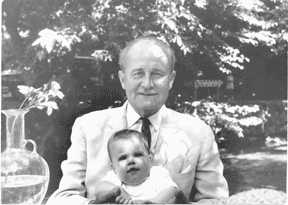
“Write about your father!” was my first command to the workshop Re-Write Your Life: Creative Memoir Writing, born some three years ago in the old Calvert Library in Prince Frederick. As spurs to the imagination, I’d brought diverse father poems by poets such as Robert Hayden, Theodore Roethke, Stanley Kunitz. These brief examples set everyone to scribbling what they recalled of their fathers.
My theory: Present or absent, biological or adoptive, kind or cruel, the father is a primary presence in all our lives. Each is unique. If one can write as honestly as possible about one’s father, then the rest of the unfolding may flow.
Monthly I compile and email brief selections by writers well-known and obscure from a variety of sources — literary, scientific, philosophical, medical, historical — that might inspire the memoir writers. And they do.
Scribbles may reappear as typed drafts at the next session, or new pieces emerge. With more salient details and editing, typed drafts become palimpsests. We edit with well-honed pencils, and authors argue for their cherished lines. Supportive classmates query about details and give each other feedback. The meeting room becomes a bell jar or security bubble around confidences — and confidence.
Gradually polished pieces emerge. Not everyone initially had the ambition to view themselves in print, but some did and have realized that amibition. Pieces by Alison Norville, Helena Mann-Melnitchenko, Sandy Anderson and John Riedesel have been accepted by Bay Weekly and other publications.
Lillian Caplins’ poem on life here won a place in the Poems of Calvert County anthology. Ruth Arbuckle, a pianist with failing eyesight, teamed with artist Annie Moore to produce a book for children. An account by a different Helen, on driving a truckload of bricks to a job on the wrong country lane, was a natural candidate for radio … but she has driven somewhere up the road.
New memorists of various ages and stages have wandered in and out of the class over the years, their regularity challenged by work and family demands. Some newcomers hoped we focused on genealogical research or greeting-card verse. No, we aim rather for the well-crafted literary memoir, building a few pages at a time. Individual pieces of publication quality may eventually be organized into a cohesive whole. The stalwarts continue to aim for greater interest, communicativeness, craft — and excellence.
As for my own ebullient, ever-fascinating Russian-born father George Leonidovich Artamonoff, he was a walking encyclopedia, engineer by training, historian by love, mountain climber by choice. He died at almost 80 as a U.S. Army colonel retired, proud his granddaughter was following his path.
He argued early that Father’s Day — with all its ads to buy, buy, buy — constituted outrageous commercialism and should be ignored. So I never dared buy him a Father’s Day card or pair of socks. I’ve merely written, still write, pages about him, poetry and prose, pieces he will never see.
For Father’s Day 2007, meet seven fathers, reflected in their children’s words.
Elisavietta Ritchie, of Broomes Island, is author of 14 books and chapbooks of poetry, prose and memoir. She is current president for fiction, Washington Writers’ Publishing House.
Clarence Knight Conard Jr.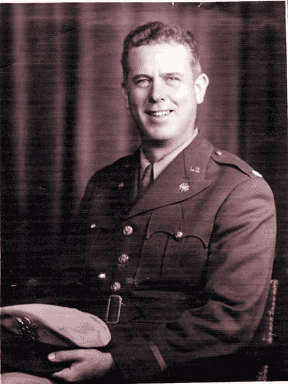
by Sue Conard Hamilton
My father was the most important person in my life. I was his only child. We shared many confidences and interests, especially in natural history. On weekends he took us hiking to find birds. He became a metallurgical engineer to support himself, but I think he would have liked to become an ornithologist.
However, the Depression left even engineers unemployed, so he took a job on a schooner sailing to Australia, where it turned out they had need of metallurgists. When World War II threatened, he was allowed to join the U.S. Army and was put in charge of Small Boats in Australia.
At an early age, I knew he expected me to watch out for my mother: He loved her and teased her, but knew she was impractical. I was to be the practical one when he was away, the one he taught to change the fuses.
I absorbed his ideas and tried hard to live up to his ideals of integrity and intellectual excellence. It was tough; inevitably, I disappointed him.
He was upset when I abandoned my ornithology thesis to follow my husband abroad. When I became pregnant, he knew I would not finish my doctoral degree. Our last words, as I boarded a plane for France, were angry.
My first born, Daniel, arrived on a Saturday in April. Six weeks afterward, my father, never having seen his grandson, died of a heart attack. I wept many tears over that little baby boy. Even today, I cannot hear my father’s favorite song, “Danny Boy,” or “Londonderry Air,” without crying.
I also dropped my first love to support a family and became a computer systems analyst, which certainly helped put three kids through college. After that, I found teaching at the [Calvert] Marine Museum a real joy, and this in some way helped to fulfill my father’s dreams for himself and for me.
My father died 40 years ago, but it could have been yesterday, for the sadness inside me has never gone away.
Sue Conard Hamilton is retired from Calvert Marine Museum, where she interpreted educational exhibits.
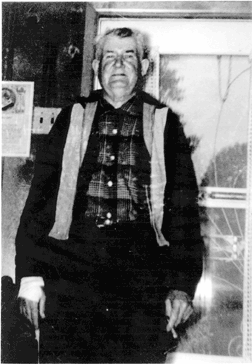
The Quiet Man
by Lillian Caplins
Father was a big man who said very little. He did his duties silently and thoroughly and was a hard worker and good father in every way. His own early life was sad. Orphaned young in Lithuania, he came to America under an uncle’s sponsorship. Life experiences were his school.
Not a religious man, he made certain we attended church. We prayed for him and his conversion. This is not to detract from his goodness; he just didn’t feel a need to go to church. The strict rules turned him away.
First we had a general store in Baltimore, then the West End Tavern, and lived in an apartment on the floor above. “Don’t listen to those songs,” my mother insisted as the music trickled up through the floorboards.
I think the men kidded my father a lot about not having boys. In our family we were five girls. Men in those days were macho and felt inadequate without a son. Dad walked around with a cigar in his mouth.
Father felt the woman of the house had the responsibility to raise us. Everything was left to mom. He never laid a hand on us for punishment, never reprimanded us verbally. But we were terrified of a command, and we used him as a threat in disciplining. I remember my sister calling out, “You better get down here, or I will tell Dad.”
When my disobedient sister slipped out and went roller-skating, she crashed into a car and fractured her skull. Henceforth the hand of God intervened. The frequent comment thereafter was, See what happens when you disobey. When I was in my teens, he once questioned me as to the time I arrived home the night before. I felt like melting into the woodwork.
We enjoyed closeness through our mutual love of growing things and going crabbing in the Bay. Together we discussed plants and animals. He particularly loved animals. Our house had a dog, cat and canaries. The first gift to my son was a baby goat.
Finally, his wish was indirectly fulfilled: I bore five sons and one daughter. And as a school nurse as well as OB nurse, I looked after and delivered as many boys as girls, so Dad would feel vindicated.
Lilllian Caplins is a retired nurse in hospitals and schools.
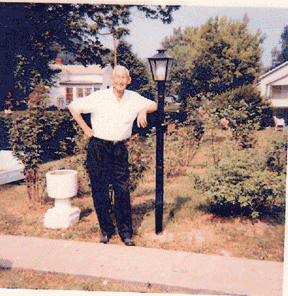
Benjamin Franklin ‘Frank’ Perkins
by Anna Perkins
I didn’t talk much with my father. He was there when I was growing up, but we didn’t have conversations. Mostly we nodded, asked “Where’s Mom?” “It’s cold outside.”
He was handsome: tall, slim, neat, a Gregory Peck look with blue eyes and a good sense of humor. Once he said, “You don’t need those eye glasses, your mother just wants you to look like her.” Did my father believe that? My elementary school checked every student’s eyes: Mine were part of my poor-reading problem. Later I understood that was his humor talking.
In World War I, he “just guarded the Mexican border.” I didn’t know if that was another something invented to see if it would be believed.
He would have liked more than that third grade education, but he did live in a time of tremendous change. Born in Kentucky hills before the automobile, on his own at 14, in the army through the war, he started working for the railroads during the Roaring ’20s.
In the Depression, he struggled, lost wife and baby, was left with three motherless young ones. He found a new wife. With two new babies, he was working hard, playing cards, and taking “walks” through the ’40s, ’50s, most of the ’60s. He could tell many stories of those times. I would like to hear them, too.
He had a solid air, never doubtful. Even his work clothes were starched. Before I woke, Mother prepared his lunch bucket with egg, baloney or bean sandwiches, apples, peaches, coffee. Off he would walk or catch a ride. We had no car until I was 16, but Mother said he liked to walk. Later I realized what a walk.
In Huntington, West Virginia, he worked for the Chesapeake & Ohio Railroad as a crane engineer at the shops some four miles away. The route took him along the railroad tracks, practically touching our house, across the railroad trestle where the river gleamed below between the railroad ties, on toward the yards. Blue dust from the rails and yards settled everywhere, including his blue starched work clothes. That was a large part of his life, 45 of his 72 years.
When his eyes twinkled, we waited to see what he was about. When I was eight, learning about the world, he told me, “The earth is flat, just look out the window.” Then he smiled. I thought he was just teasing. It was more his way of saying hello, how are you, drawing closer without being drawn close. He was a complicated man, knowing more answers than questions, a father mystified by parenthood.
On the rare church visit, restaurant (we went once), my high school graduation, he seemed so certain in pinstripe suit, gray fedora, polished shoes, ruby ring, gold pocket watch: What need to associate with others except as a quiet, strong, sure man?
Sometimes after work, he rested on the back porch, studying his acre of vegetables he and Mother canned for winter. He read the newspaper, waited for her to return from work at a downtown dress shop and fix dinner, watched TV (when we finally got one) and went to bed early. A simple life, but we never had real conversations.
At age 18, I left for a Pentagon job and have lived around the Chesapeake area ever since.
We had one conversation on my last visit. He said it was the last visit.
“No,” I said, “You’ll be all right, you’ll live a while longer.”
He died soon after. He was right. We both knew that.
At his funeral, I didn’t cry but did wear sunglasses in case. I had gone directly from airport to funeral home. My mother waited in the large room where the service was scheduled, glad I arrived. We had not been getting along that well in recent years, but this was family. I sat on the floor beside her bench while she told me the funeral was planned ahead, but the funeral home they had selected turned out dark and dusty, so she had my father moved the night before to this light, comfortable place. Dad would approve.
Only my mother in all of her grief, I thought, could remain strong enough to change arrangements to be sure the best was done to maintain my father’s dignity. I loved her for that. I did cry at the cemetery when the honor guard fired their rifles.
I sometimes have those conversations. Some say I have his dry, quick, humor. So I must have known more about my father than I thought. Maybe he knew that.
Anna Perkins is a retired budget director for the federal government.
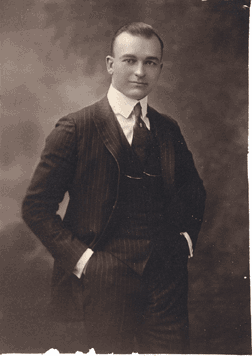
Daddy Wore Spats: William J. Norris
by Sally N. Douglass
He was the only man I have ever seen who did so. His feet looked like Fred Astaire’s. Otherwise he was Eddie Arnold’s double. A natty dresser, he was always neat and well-groomed, with well-tailored suits saved from his professional career. His nails were manicured. It bothered him that his hairline was receding. His voice was a wonderful blend of a Virginia, North Carolina and New York. We urged him to audition for a radio job because of his beautiful voice and excellent diction. He never did.
Daddy enlisted in World War I, was severely wounded in France but recovered strength and health by determined efforts and became proud of his excellent physical condition. He attended college, earning his degree in engineering.
When my parents married, they lived in a new house my grandfather bought for all of them. After Mother died, Daddy lived in a room in Manhattan and I lived with relatives in Troy, 150 miles away.
It was the Depression. Daddy, a graduate engineer with winsome personality, was unemployed or worked for the WPA for little money. Surely, he stood in bread lines. He never discussed his work when he visited. The aunts and uncles with whom I lived were Republicans, disdained FDR and his recovery programs. Daddy idolized the president.
He struggled during those difficult years but saved enough to buy me exciting gifts for Christmas and birthday. Still memorable are the Dionne quintuplet dolls in their pink suitcase. One year he gave me five pretty blouses, all the correct size.
When he saved enough money to ride the New York Central Sunday excursion, some $3 round trip, he visited me in Troy every month or two. Daddy was so glad to see me, hug and kiss me. I felt loved, never abandoned. Between visits, I wrote him and always looked forward to his letters of fatherly advice: Be sure to brush your teeth at least twice a day.
He would arrive at the railroad station before noon. The “dear old aunts” prepared him a Sunday dinner, perhaps his favorite, meatloaf or chicken fricassee with dumplings. After dinner, Daddy and I might go to Beman Park for the swing, slide or seesaw. I loved to recite Robert Louis Stevenson’s poem, “The Swing” as I went “up in the air so blue.” Skipping home beside Daddy, I thrilled to be with this handsome, loving man with beautiful voice and good humor.
Then the piano would draw him, he played by ear. In magnificent baritone he sang his limited repertoire. I remember one refrain, “You are the one rose that’s left in my heart.” I think he was singing to my mother.
Aunt Flora, a frustrated concert pianist, did not applaud his playing: He was not truly playing the piano since he could not read music. To me, defender of my father in all things, that was even cleverer than reading music.
I always played my latest piano piece for Daddy. I was never very good, but Daddy was a dreamer. He looked forward to my debut in Carnegie Hall, which he planned to rent. I lacked talent; Daddy lacked money. After a pleasant visit, we would take Daddy for his train back to New York.
I cried when Daddy said I could not attend Cornell University because he could not afford it. I turned out happy at Russell Sage College, living at home, brown-bagging daily as in high school. Between the tears and actual departure for college, I’d met and fallen in love with Bob so was happy not to be in Ithaca.
By then I saw another of Daddy’s dreams would not be realized. He promised a car when I graduated; I never counted on it. I knew he wanted to buy me a car; I knew he did not have the money.
During World War II, things looked up for Daddy. He found jobs, met and married lovely young Myrna. One of the thrills of his life: on September 7, 1953, he became a grandfather and a father the same day! Soon after Daddy and Myrna received the telegram about my son’s arrival, Myrna went to the hospital and delivered their second daughter. I can see him strutting proudly in the hospital corridors.
We stayed in touch but could not meet in those later years. As I got older, I could see what a sad, difficult life Daddy had. He had lost his beloved first wife, lived apart from his dear daughter, yet never complained, found humor in life, remained jolly, laughed enthusiastically. He accepted people and situations as they were. I still wonder why he wore spats.
Sally N. Douglass was born in Brooklyn and grew up in Troy, New York. A wife, mother and grandmother and retired home economics teacher, she now lives in Port Republic with her husband, Bob.
A Different Kind of Waterman: Bob Comstock
by Sandra Lee Anderson 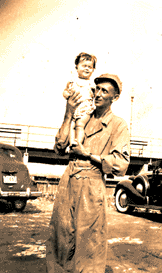
Dad was a water resources guy. Not the kind around here, but it’s what brought me to Southern Maryland. He was born in Colorado on the eastern slope of the Rocky Mountains before the plateau swoops down to the plains. Dry, but the only land left for late-arriving homesteaders. The rain was stripped from the winds by the western slope before it could reach the dry-land farmers.
The homestead had a creek, the Rickaree. One rare day a sizeable amount of water was flowing. “Low for this time of year,” the land salesman lied. Dad’s love of fishing couldn’t have come from the Rickaree.
Bob Comstock went into civil engineering to bring water to farmers. World War II interrupted his education, and the Army Air Corps sent him to Atlantic City, where I was born. There he fished the Atlantic surf and told of rescuing a seagull from fishing line.
He graduated from University of Colorado as a civil engineer, to construct dams and canals. We lived in a tin airplane hangar-shaped Quonset hut, housing for returning soldiers. My first memory at four is a big catfish splashing my face as I peered over the kitchen sink.
I remember waking to frigid temperatures high in the Rockies, too cold to peek from the sleeping bag. My little sister is asleep with Mom in her bag; Dad is out starting the fire and rigging his fly rod.
Dad caught polio in the 1950s, losing the use of his left arm. This didn’t hamper his fishing: He rigged a stiff leather harness, fitted an eight-inch pipe to it and strapped this around his waist. When fish bit, he jammed the rod into the pipe and commenced reeling.
He worked for the Bureau of Reclamation, first bringing water from the Frying Pan River high in the Rockies to the Arkansas River on the plains. We spent a summer with Dad fishing for rainbow and brown trout while my sister and I played in the woods around our cabin and worried about bears.
In Oregon, he designed small dams for the Klamath River Basin on the eastern side of the Cascade Mountains. The Cascade Mountains also rob clouds of their water, creating lush valleys to the west but dry highland desert to the east.
Dad took me fishing on Link River between the huge Klamath Lake and headwaters of the Klamath. The link is a channel between the two that diverts water for the farmers and generates power for the town. Our dog, Spot, rapturous, would run around to roll in the nearest stinky fish.
Dad also took us across the Cascades to fish the Rogue River where steelhead trout drove themselves upstream to spawn. We joined combat fishermen standing shoulder to shoulder where Klamath River joins the Pacific.
I could have been a replacement for a son, but a daughter seemed just fine. If she fishes, that’s a bonus.
In Arizona he worked on the Salt River Project with his friend, Jack Jorgensen, then joined Jack in summer, 1965, to work in Washington, D.C. I tagged along.
As we were orphans to this area, a Bureau secretary invited us for a weekend in Calvert Beach. Her waterfront place had been the residence of a vegetarian society. Signs claiming Salt is Poison hung on musty walls. Locals maintain it was a nudist colony. We slept beneath rafters where a long wall divided the dorms for men and women. I fell asleep to the rhythmic waves through the screened window. On that beach I found my first great white shark tooth, two and a half inches long.
Later Jack bought that beach house. He had joined the Beaches Water Company Board and brought experience with water projects to the struggling company.
I married another fisherman, Charlie. We spent summers fishing the surf off the Outer Banks. My parents joined us at least once, but Dad was tired, could only watch. Emphysema from a lifetime smoking took him down.
About eight years ago Charlie bought a boat and moored it at Flag Harbor, down the beach from Jack’s vegetarian beach house. Charlie and I built two houses away, near enough to visit Jack, glimpse the water and easily comb the beach for sharks’ teeth. Jack has died; now I serve on the Water Board.
Our older daughter, Ashley, also became a civil engineer. A paper she wrote will be presented at the national conference of civil engineers. Dad would be proud.
Ashley loves to fish and married a fisherman she met in Seattle who was born in St. Mary’s County. I will buy their new baby boy, our first grandson, a fishing pole for his first birthday.
Sandra Lee Anderson is a former D.C. schools administrator. This is her second story for Bay Weekly, where she broke in with the memoir Hostile Fire (Vol. xv, No. 18: May 30).
For My Father: Lindley James Burton, 1921-1986
Mathematics Professor at Lake Forest College, Lake Forest, Ill., where I grew up
by Ann Trentman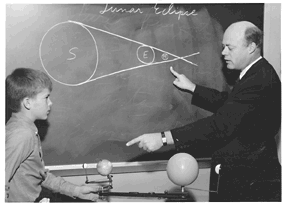
So busy missing you
I forgot to thank you.
At first, I felt pain,
and ran away into the arms
of one who could console me.
He and I raised children
in ways you had taught me.
I look into our children’s eyes,
feel the sadness of your death,
and find a gift of joy and life.
Ann Trentman is an artist and homemaker.
Ted Riedesel
by John Riedesel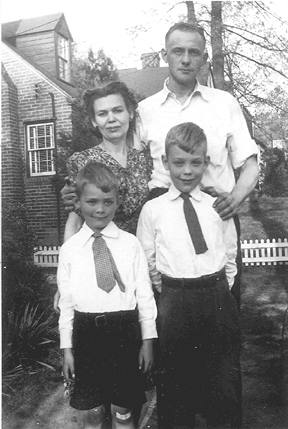
Tribute
Who wouldn’t like Ted Riedesel?
Gentle, loving, down-to-earth, “Halvor”
to his family, “Honey” to his wife,
“Daddy” to us. A humble man, he never
sought attention, praise, he could fix
anything, build anything. Mother led him
to the Lord; simple, trusting faith in God.
I see him sitting early mornings, coffee,
cigarette, contemplating the day before
heading out to work: a postal clerk
providing for his family.
Saturday mornings, sunny, joyous times,
he fixed his special omelets. Days off,
he repaired old cars, the paint, the house;
I wanted to be like him, with him;
my brothers felt the same.
German and Norwegian, his love was not
demonstrative, but obvious.
He taught by example without knowing it,
Guided us through adventures of childhood,
the complexities of adolescence.
He would like to travel; family forced
other priorities. He spent his life raising
boys, helping neighbors, serving God,
while I made toy buildings from the empty
cartons of the cigarettes that killed him.
John Riedesel is a retired high school math teacher.
|









